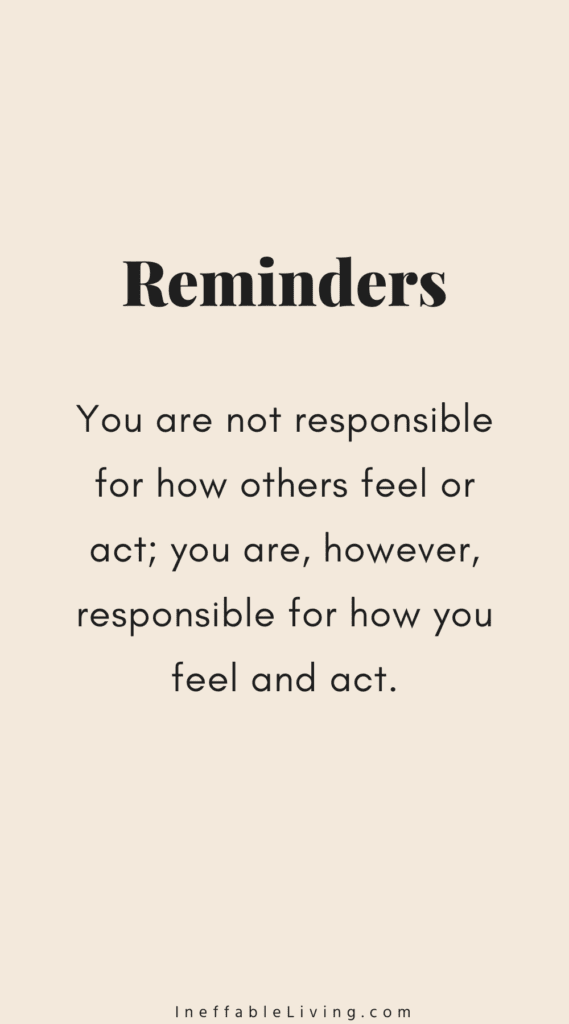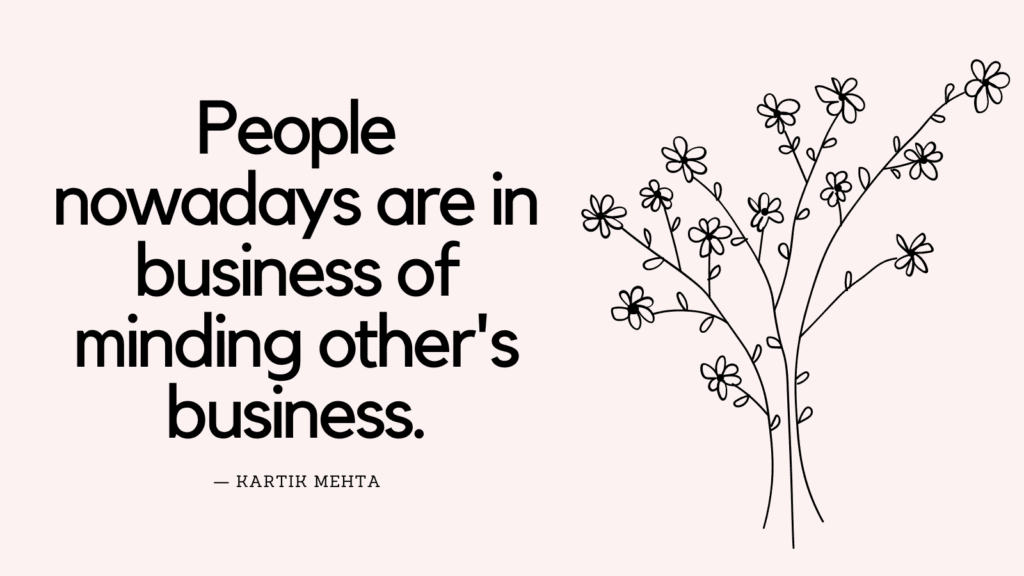This post contains some of the best stop interfering in others life quotes.
Stop Interfering In Others Life Quotes
1. “When nobody interferes with what you wear and how you wear, you are living in a civilised country at least on the matter of clothes! Happiness and freedom are often the same thing!” ― Mehmet Murat ildan
2. “These are peculiar times. It is not worth interfering with anybody. No one knows how to talk nicely! People talk in a way that gives others a ‘headache’.” ― Dada Bhagwan
3. “People nowadays are in business of minding other’s business.” ― Kartik Mehta
4. “Is not it interesting that you had everything you needed in the first nine months, why is not that true for the next ninety years, because we interfere.” ― Wayne W. Dyer
5. “If you think it cannot be done, please don’t interfere or interrupt the rest of us trying to do it.” – R.J. Intindola
6. “The most important thing to do in your life is to not interfere with somebody else’s life.” – Frank Zappa
Related: Best 6 Ways to Let Go of Wanting to Control Everything
7. “Anyone who interferes with the destiny of another thing never will discover his own.” – Paulo Coelho
8. “Sometimes, when you want to make a difference in a person’s life, stay out of it.” – Dane Cook
9. “The more a person perceives that he/she is loved, the less they will interfere with the lives of others.” – William Glasser

10. “People have nothing to do and therefore they interfere with the life of others. I don’t want to interfere with the life of others.” – Vaslav Nijinsky
Related: Top 70 Detachment Quotes To Help You Let Go
11. “You should not interfere with the flow of water. It flows by itself; no one will stop in that flow. If one interferes in it, the outcome will be spoilt.” – Dada Bhagwan
12. “People offer free advice because they don’t use that advice for themselves anyway.” – Amit Kalantri
13. “Interfere with the reality of my world, and you therefore take the very life and heart out of my will.” – Josiah Royce
14. “If anything interferes with my inner peace, I will walk away. Arguments with family members. All that stuff. None of it matters.” – Shirley MacLaine
15. “The Tao teaches us not to intervene and interfere. The things we love we have to learn to leave alone. And the people we love we have to learn to let them be.” – Wayne Dyer
Related: What Do Boundaries Sound Like? + 35 Boundaries Examples

16. “Detachment is never letting someone else control how we think, feel, or behave.” – Karen Casey
17. “Detachment is making no one a project.” – Karen Casey
18. “Detachment is simply watching the events that are unfolding around you, getting involved only when your journey is part of the experience.” – Karen Casey
19. “Detachment means taking no hostages.” – Karen Casey
20. “Detachment is understanding that we are never the cause of someone else’s actions.” – Karen Casey
21. “Detachment is knowing that what others do is not a reflection on you.” – Karen Casey
22. “Detachment is letting decisions that need to be made by others be only theirs.” – Karen Casey
23. “Detachment is living one’s own life while letting friends and family live as they choose.” – Karen Casey
24. “Detachment is knowing that happiness is the by-product of how we live our lives, not how others are living theirs.” – Karen Casey
25. “Detachment is letting others take care of their own affairs.” – Karen Casey
Related: How To Live A Peaceful Life? 101 Timeless Principles to Find Peace Within Yourself
26. “Advice is seldom welcome; and those who want it the most always like it the least.” — George Chapman
27. “Before you open your mouth, ask yourself, “Is it in the best interest of the relationship for me to give this unsolicited advice?” If not, then keep quiet.” – Christy Largent
28. “To offer a man unsolicited advice is to presume that he doesn’t know what to do or that he can’t do it on his own.” – John Gray
29. “Generally speaking, when a woman offers unsolicited advice or tries to help a man, she has no idea of how critical and unloving he may sound to him.” – John Gray
30. “Unsolicited advice is the junk mail of life.” – Bernard Williams
31. “Unsolicited advice is usually more about the needs of the giver than the receiver.” – Charles F. Glassman
Related: Top 10 Tips to Practice Compassionate Detachment
32. “People who are overweight don’t want unsolicited advice. Guess what. We know we’re fat. We live in homes with mirrors.” – Al Roker
33. “Never offer unsolicited advice. The receiver might not know that you are smarter than him.” – C.J. Langenhoven
34. “There is a time to provide advice and offer an opinion, and there is a time not to. Don’t be too quick to offer unsolicited advice. It certainly will not endear you to people.” – Harvey MacKay
35. “I never give advice unless someone asks me for it. One thing I’ve learned, and possibly the only advice I have to give, is to not be that person giving out unsolicited advice based on your own personal experience.” – Taylor Swift
Related: Compassion Fatigue Self Test
Why Stop Interfering In Others’ Life?
While it is important to care for others and offer support, there are a few reasons why it is wise to avoid interfering too much in other people’s lives:
1. Respect for autonomy: Every individual has the right to make their own choices and decisions. By constantly interfering, we may unintentionally undermine their autonomy and sense of self.
2. Learning from mistakes: Making mistakes and facing challenges is an essential part of personal growth. Interfering excessively can deprive individuals of the opportunity to learn from their own experiences and find their own solutions.
3. Building resilience: By allowing others to navigate their own lives and overcome obstacles on their own, we promote the development of their resilience and problem-solving skills. These qualities are crucial for building a strong sense of self-reliance.
4. Encouraging independence: Interference can create a dependency on others for decision-making and problem-solving. Instead, supporting individuals to develop their own independence fosters a sense of confidence and self-assurance.
5. Preserving relationships: Constant interference can strain relationships by creating feelings of resentment or frustration. Allowing others the space to manage their own lives helps maintain healthier and more balanced relationships.
Instead of interfering, it is often more effective to offer guidance, support, and encouragement when requested or when appropriate.
It is important to strike a balance between being caring and involved while respecting the autonomy and personal growth of others.



